| 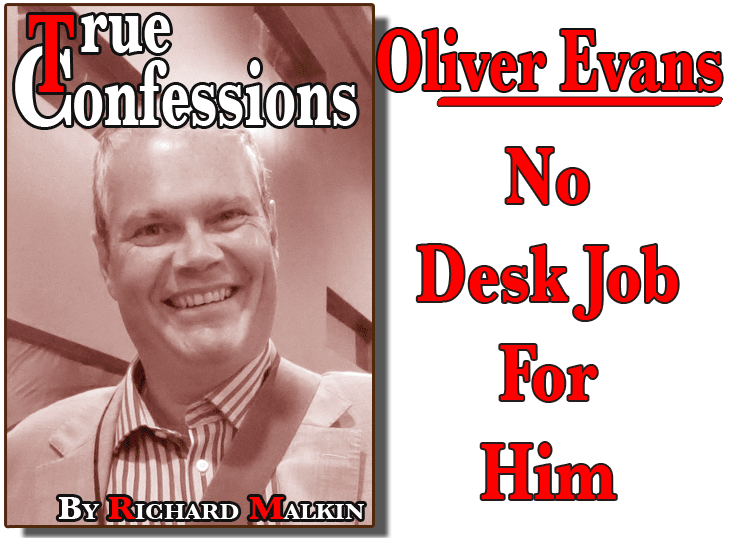
It was Samuel Johnson
who observed that languages are the pedigrees of nations. And it was Oliver
Evans, chief cargo officer of Swiss International Airlines and chairman
of The International Air Cargo Association, who leaned on those pedigrees
to broaden his executive and managerial talents in a global air cargo
universe.
Master of five languages, he has directed
his attention toward the growth of new business capabilities to meet today’s
challenges head-on. Over the decades in the transportation industry, Mr.
Evans has “deliberately shaped” his career to amass experience
as part of different logistical thrusts in different countries.
Asked to comment on the current state
of the transatlantic cargo market, Mr. Evans noted that despite media
reports of economic recovery, “especially in the United States,”
he stated that “the opposite is true of Europe where many countries
are stagnating or even threatened by recession.” (On the other side
of the world, Japan has fallen into another recession.) There was hope
in the fact that 2014 experienced a recovery of air freight volumes, but
that bit of good news took a steep nosedive under the impact of a “spectacular
increase in capacity.”
He held that overcapacity on the transatlantic
run drove rates for many large general cargo traffic to a point where
“they no longer cover variable costs.” Add to the foregoing
shifts in modal transportation, miniaturization, and “gadget convergence,”
and re-engineering in the supply chain. Insofar as Swiss WorldCargo is
concerned, its principal focus is on “care-intensive” products
that require solid reliability—an area of service that brings “a
reasonable return.”
The iron dictates of geography have
imposed certain constraints on Swiss WorldCargo whose home base is landlocked.
Long ago it turned its back on competing for volume, instead focusing
on specific markets.
The carrier’s concentration
on market specialization—temperature-sensitive pharmaceuticals and
laboratory and high-tech material, for example—has proved to be
a wise course to follow. Remarking on the tough year 2014 turned out to
be for the industry, Mr. Evans drew obvious satisfaction from SWC’s
results which were “ahead of budget for the year to date.”
Swiss WorldCargo is one of the four
cargo-oriented sevices forming Lufthansa Cargo Group. Mr. Evans explained
that the German airline’s group comprises a number of “air
freight-related companies whose portfolios of destinations, capacity,
products, and services complement each other.” The core of the group
is formed by Lufthansa Cargo and “seven other providers of belly
and/or main deck capacity.” SWC’s chief went on to state:
“The Lufthansa Group have wisely
chosen a very flexible approach to forming alliances inside and outside
the group so that Swiss International Airlines and Austrian, for example,
have chosen very different paths to success—specifically, it has
been recognized that the high degree of autonomy enjoyed by Swiss WorldCargo
brings huge financial advantages to customers and shareholders.”
SWC, whose total lift is without all-cargo
capacity, schedules 63 flights per week in both directions to/from the
United States. It markets the freight capacity of the Swiss International
Airlines fleet: Airbus A330-300 and A340-300 for long hauls, and narrowbodies
for short and medium hauls. Joining the fleet in 2016 will be the Boeing
B777-300 ERS (long haul) and the Bombardier C series (short haul).
Based on 2013 statistics, Europe (37
percent) and Asia (36 percent) turned out to be SWC’s leading sources
of cargo revenue, with U.S./Canada (16 percent) a poor third. In descending
order were South America (6 percent), Africa, and Australia/New Zealand
(2 percent each), and Middle East (1 percent).
Air cargo’s middlemen, the IATA-authorized
cargo agent and the air freight forwarder, burst into quick prominence
in the new air freight market on the heels of World War II—not to
unanimous applause from the airline side. The ensuing decades have produced
a large measure of middleman-carrier cooperation and emotional stability—but
one with an alert ear cannot miss occasional grumbling on either side.
How do the forwarder and agent fit into SWC’s drive toward heavy
goals? Are they major or minor elements in the big picture?
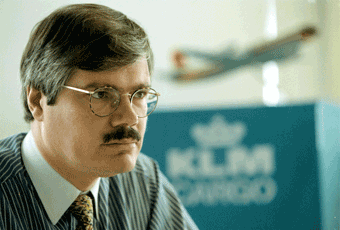 In a flat statement, Mr. Evans stressed
the point that the forwarder’s value to the customer is “huge”
because he “plans and executes the entire supply chain.” In
other words, the forwarder’s acknowledged expertise and “core
competencies” exceed the airline by far. This naked fact makes the
forwarder a natural as an airline customer. Having given the forwarder
(and agent) their due, Mr. Evans followed with another aspect.
In a flat statement, Mr. Evans stressed
the point that the forwarder’s value to the customer is “huge”
because he “plans and executes the entire supply chain.” In
other words, the forwarder’s acknowledged expertise and “core
competencies” exceed the airline by far. This naked fact makes the
forwarder a natural as an airline customer. Having given the forwarder
(and agent) their due, Mr. Evans followed with another aspect.
“It is clear that in the highly
specialized segments that we serve, the degree of sophistication of services
to be provided means that the forwarders welcomes our direct dialogue
with the end user, his customer,” he said. “Air cargo in these
segments is not a commodity, but a highly prized service, and forwarders
consider us as an ally and partner in acquiring business because of the
airport-to-airport expertise we bring to the table. While not at 100 percent,
by far the majority of the cargo we carry is acquired via the forwarding
community. Certain very specific customers, such as banks, do trade directly
with us.”
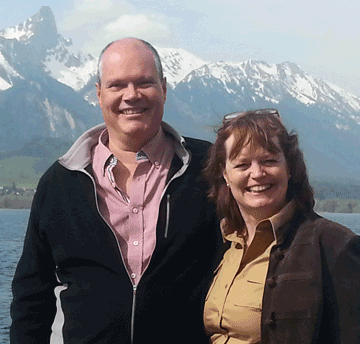 Oliver
Evans with his wife, Liz at their favorite spot in Switzerland. Oliver
Evans with his wife, Liz at their favorite spot in Switzerland.
At age 60, Oliver Evans, articulate
pilot of Swiss WorldCargo, was born in Chaville, France, claims French-British
nationality, and makes his home in Switzerland. He is married with two
children. He has a BA degree from the University of Manchester. His record
in transportation-industry activity—both air and surface—covers
substantially more than half a lifetime.
After joining Ocean Transport &
Trading PLC in 1976, Mr. Evans spent a year in management training, which
brought him to London, Milan, and New York. Assigned to what turned out
to be a series of commercial and operations positions in the latter city,
the young man was filling the office of vice president and general manager,
U.S.-West Africa in 1985 when he was named manager-strategic development.
He was to last two more years dealing with sea cargo. In 1987 he responded
to KLM’s beckoning finger.
The modal change brought Mr. Evans
to the British capital where for the next two years he served as cargo
sales and marketing manager–U.K./Ireland. In his professional ascent
at the Dutch airline, he moved to regional cargo manager–Southeast
Asia (Singapore); deputy cargo area manager–Asia, Australia, Middle
East (Singapore); cargo sales director–Central and Eastern Europe
(Frankfurt); sales and marketing director worldwide, Business Unit Air
Cargo (Netherlands); vice president-strategy and alliances; KLM–Alitalia
cargo joint venture (Netherlands); vice president–cargo alliances
(Netherlands).
It was a 14-year adventure in the
service of KLM, in a way reminiscent of Tennyson’s “so many
worlds, so many things to do.” There followed a year-long intermediate
period at BAX Global as vice president–global sales, and toward
the end of 2002—Voila!—he showed up in Zurich to enter the
employ of Swiss WorldCargo as executive vice president. That same year
Mr. Evans was advanced to chief sales and marketing officer, and it took
but another seven months—in March 2002—for him to assume Swiss
WorldCargo’s presidency.
He has contributed his talent and
energy to a string of professional organizations, including IATA and TIACA.
And he admits to such hobbies as rowing, hiking, swimming, and reading—but
one’s left wondering, since a day consists of only 24 hours.
Possibly the greatest part of his
attitude toward his job is his candidly declared love of travel. He is
happy hopping around the world, dropping in on customers, partners, and
staff—“and to learn from them.” Leadership, he stated
strongly, does not equate with a desk job. As far as vocations go, his
is a “wonderful” one. It’s a journey that “goes
from one end of the planet to the other—and never ends.”
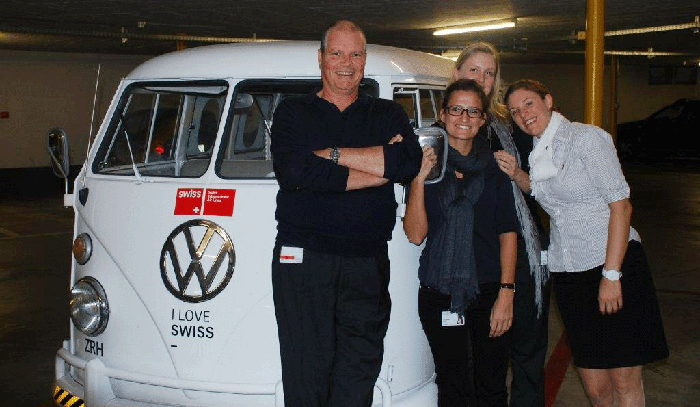 |
In response to a suggestion
he identify the present-day air freight customer’s No. 1 complaint,
SWC’s head underscored the “slow pace of real change in the
transformation of industry’s processes.” That customer, he
added, is on the right path when he demands a redoubling of industry effort
to bring about the urgently desired transformation. He expressed astonishment
at “how much acceptance there is for mediocre services, and how
many customers still go with the cheapest price.” In the long term,
he insisted, quality and reliability provide the best pay-off.
Two competing questions: Price? Service?
Mr. Evans stated emphatically that if price had been the primary choice
of air carrier, “he would have been out of business a long time
ago.” SWC, he maintained, ignores the needs of the mass market,
offering neither the required capacity nor price level. Still, he conceded,
SWC is hardly immune to pressures in the marketplace and competition,
and it makes a special offer to “provide the best quality-price
relationship to help our customers to prosper.”
Are air freight forwarders throughout
the world of a single stripe, or are their striking differences in professionalism
influenced by location?
The era of substantial differences
in levels of education and expertise around the world is long over, he
said. The air freight industry is now a “global village” where
data and knowledge are at one’s fingertips. He went on to point
out that resourceful forwarders of any size “can be in the most
challenging of environments where basic infrastructure or trade facilitation
leaves a lot to desire.”
What can he say about those disturbing
reports about confirmed air shippers reverting to surface modes? Mr. Evans’
initial reply was to call attention to the fact that supply chains are
under endless review and companies settle on different transport modes.
Acknowledging that of late there has been considerable talk about the
shift from air to ocean, he tagged some of it as pure exaggeration. Why
so? Because only the cheapest commodities are affected. On the other hand,
“goods of a certain valure, particularly in the earliest stages
of entering the market, will always benefit from air transportation.”
Are the modal shifts worrisome to SWC? Not nearly as much as the transfer
of “the airline-forwarder alliance to the integrator.” As
a defense, SWC is creating solutions for the forwarder to “retain
that growing business segment for ourselves.”
After that big industrywide build-up
of e-freight’s paperless glory, where does it stand today? Mr. Evans
is clearly on record as there is “enormous room for improvement
and acceleration.” He was pleased by what he described as new “momentum”
in the number of e-AWB transactions. His tone changed as he said, “Let’s
not kid ourselves; this is just one document out of many, and there is
a long, long road ahead.” Mr. Evans hastened to express his belief
that there exists an opportunity for an organization like TIACA to “bring
together all the parties involved, from regulators to shippers and all
in between—including the various other associations representing
these diverse groups—and convince all to strive for industrywide
solutions rather than one-to-one solutions.”
For a change of pace, Mr. Evans was
asked for his opinion of the average shipper’s grasp of the basic
economics of air freight transportation. Were they fully conversant with
its pluses and minuses in relation to their particular businesses? Were
there significant gaps? He quickly pointed out that, on the shipper side,
“supply chain practitioners are looking at all modes of transportation
with air often being the minor share in terms of volume.” It remains
for the airlines and the forwarders, he continued, who are faced with
a “big job” in continuing assisting shippers, as well as the
wider public, to “understand the vital role we play in the facilitation
of global trade.”
Actually, Mr. Evans’ business
contacts, which certainly include procurement and purchasing executives,
are diverse. Most important, he went on, is to understand that “it
is not the function or trade of anybody you deal with, but how you interact
with them.”
Questioned whether cargo marketing
practices have undergone change, SWC’s boss instantly replied, “Thank
goodness, yes!” In sharp contrast to those days when air carriers
“took cargo for granted and invested minimally,” industry
maturity has shaped it as competitive as any other. The airlines are now
in a position to make total use of “the entire spectrum of capabilities
and channels, from social networks to internet advertising and more traditional
paths.”
In pursuit of his professional duties
and corporate obligations, Mr. Evans has traveled the world over. Thus
it was simply considered routine to ask him where, in his personal opinion,
the world’s top three cargo airports are located. He momentarily
stunned the interviewer with the prompt reply, “Zurich, Geneva,
and Basel, of course.” This was accepted as a show of pride and
possibly tongue-in-cheek. He explained: “Our airports reflect the
exceptional nature of our infrastructure, and provide examples that others
can follow. But because freighters are not part of their day-to-day bread-and-butter
business, I do have to work hard to remind them that their national airline,
and therefore they themselves, prosper also because of the huge cargo
contribution.”
The international airlines have never
been without a slew of problems. What did he consider to be their current
major headache? Noting that they straddle two distinctly different businesses—cargo
and passengers—the two “rarely develop in sync.” This
leads to a path to a variety of “distortions and dilemmas.”
Extending even to the political. No, his job is not an easy one, but—with
a broad smile—“Don’t we just love it.”
The element of cargo security ranks
high at SWC. Mr. Evans claimed that the Swiss carrier has won universal
recognition as a “global leader” in that field of endeavor.
In addition to international (ICAO), European, national, and company security
regulations, he stressed SWC’s commitment to a list of cargo-specific
programs and standards.
Gazing into the future, can he recognize
any potential dangers? It was a query exclusively related to the air cargo
industry, but Mr. Evans apparently saw this as an opportunity to give
vent to a broad intensely human expression:
“Not only our industry, but
our world is facing extraordinary dangers. Our phenomenal intelligence
has put us in charge of the future of our beautiful planet, but our equally
phenomenal stupidity often makes it seem likely that we will squander
our gifts and make an enormous mess of it all. Luckily it seems that danger
and adversity are the mothers of invention, and we are all learning with
an ever-increasing sense of urgency.”
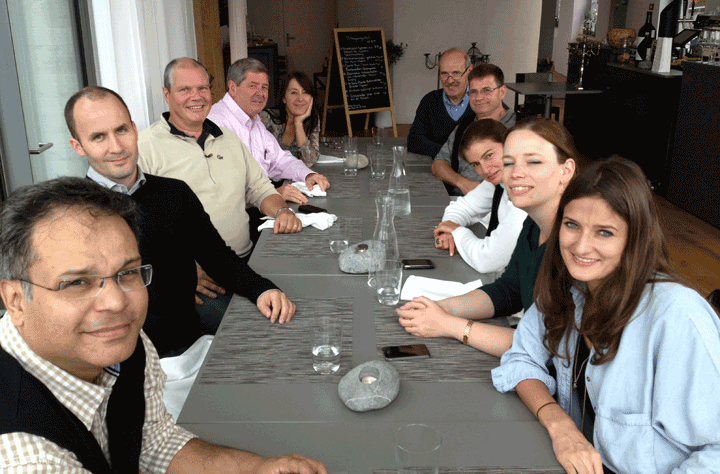
Oliver with his Swiss WorldCargo
team. |
In the scores of interviews
which this writer has conducted over the years, he occasionally requested
his subject to describe one or two significant case histories in which
he was personally involved. This request was put to Mr. Evans who denied
having the ability to answer such a question “in a succinct way.”
Why not? Because “the nature of our business is that we carry the
widest range of shipments and each one of them tells—or could tell—a
fascination story.” Expanding on the topic, he alluded to his many
years plugging away on three continents and traveling to virtually every
other corner of the world. There is a treasure chest of exciting operations
involving shipments of urgently needed vaccines, human organs, emergency
supplies, and so on. Getting down to basics, SWC’s chief offered
an invitation to any observer of the industry to “enter any one
of our warehouses, point at random to any package or box they come across
and start to investigate the story behind it: our world is indeed endlessly
fascination, and the hectic pace of our daily lives or events us from
appreciating all these wonderful stories.”
 On
a note of finality, it was suggested to Mr. Evans that, given the authority,
what would he change in the air cargo industry? He bridled at the question
because it implied he didn’t have the authority, “or enough
of it.” Standing on “firm belief and personal conviction,”
he clung to the view that all of the involved possess “incredible
powers” to create a difference—not just himself as a senior
airline executive and also at TIACA, but “every one of us.”
Underscoring this line of thought, he insisted that “we all have
daily interaction and encounters with countless others; we are all therefore
leaders in our own right, able to exercise enormous influence on the world
around us.” His desire is to help himself and others to “tap
ever deeper into this pool of potential and satisfaction.” On
a note of finality, it was suggested to Mr. Evans that, given the authority,
what would he change in the air cargo industry? He bridled at the question
because it implied he didn’t have the authority, “or enough
of it.” Standing on “firm belief and personal conviction,”
he clung to the view that all of the involved possess “incredible
powers” to create a difference—not just himself as a senior
airline executive and also at TIACA, but “every one of us.”
Underscoring this line of thought, he insisted that “we all have
daily interaction and encounters with countless others; we are all therefore
leaders in our own right, able to exercise enormous influence on the world
around us.” His desire is to help himself and others to “tap
ever deeper into this pool of potential and satisfaction.”
Away from the job, Oliver Evans is
a homebody, deep in the comfort of family life mirrored in the presence
of his Irish wife Liz and (pictured above) daughter Alison and son Luke.
For a man in his position and disposition, he must deal with a fine line
which divides work and travel on one hand, and “quality” time
spent with family. Whatever his achievements, he credits his family’s
love, support, and understanding.
The Evans family has found happiness
and comfort residing in Switzerland, and it looks like they will make
it their permanent home. In any case, Oliver Evans’ contract with
Lufthansa terminates this September, and there are compelling thoughts
about self-employment during the remaining years of his career.
Richard Malkin
 |
malkin101@aircargonews.com |





